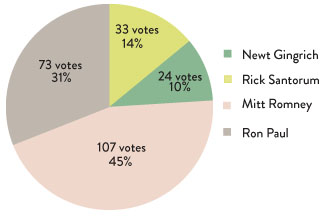
Excited to participate in their first presidential election, seniors prepared themselves to vote for a Republican nominee
Seniors Daly and Rachel did not hesitate in expressing their excitement about voting in the Texas Republican primary on Tuesday, April 3, but before the election they both acknowledged that they needed more information to decide which candidate to vote for.
“People were saying things like ‘Oh my gosh. Did you hear what this candidate did?’ They were discussing what’s been in the news,” Daly said. “We’re more invested in what’s happening, because we’re a part of it now, but I needed to do some more research before I made my final decision.”
The candidates on the ballot for the Texas primary included: former Speaker of the House of Representatives Newt Gingrich, Texas House Representative Ron Paul, former Massachusetts Gov. Mitt Romney and Pennsylvania Sen. Rick Santorum.
Before the election, Rachel planned to glean information on the candidates by researching them on the internet and talking to her history teachers.
“Right now, I have no idea who to vote for,” she said on March 22. “Once it gets closer, I’ll talk to Ms. Walder and Mr. Kramer.”
Senior Alexis, on the other hand, has been discussing politics with her family members since an early age.
“My dad is very Republican, and he’s more conservative than I am, so we discuss our viewpoints on certain issues,” she said. “But the common theme among Republicans right now is that we just want someone to beat Obama. That’s the motivation. Who will beat Obama is who we want to vote for. I’d probably say Romney has the best chance, because he appeals to the most people.”
In order to prepare their fellow students for the upcoming primary, seniors Emily and Abigail, Young Republicans Club co-presidents, sent out emails to inform students about each candidate, put up posters in the downstairs hallway and held a mock primary on Jan. 30.
“I think a lot of the candidates’ actual beliefs get hidden by some of the things they say, the stupid comments,” Abigail said. “That’s what gets highlighted in the news, so I feel like people focus on the bad things, and they aren’t aware of what the candidates actually want.”
Katie hopes Upper School students will begin educating themselves at this point in their lives about important political topics, especially because of the critical role America holds on the global stage.
“What is happening right now will be what we’re paying or making up for in the future,” she said. “I wish people would become passionate about America and its future, because [America] really stands for something. You go around the world, and America is the symbol of opportunity and hope.”
Although Democrats may vote in the Texas primary, senior Maddie, a Democrat, decided not to take advantage of this privilege.
“My parents have influenced me, because my dad’s a Democrat,” she said. “I’ve moved around a lot, so I haven’t really been in America to develop a lot of the more conservative views. But I’m just a liberal kind of person.”
Despite the seniors’ anticipation of finally exercising their right to vote, History Department Chair Steve Kramer said the Texas primary may not even be significant in the overall election process.
“You have what has to be one of the greatest ironies of politics anywhere in the world,” he said. “Your two most populous states, two of the most diverse states, Texas and California, have primaries so late that they play no role whatsoever in determining the nominee. But you have two states, Iowa and New Hampshire, which are among the least diverse states in the union, playing a significant role in who ends up being the nominee.”
And with Romney’s victory in Illinois, his nomination seems inevitable to Kramer.
“The only thing that would change that would be primaries that will occur before the Texas primary,” he said. “Originally our primary was to be much earlier, which would have helped a candidate like Santorum or Gingrich. I don’t think it would have helped Romney. The southern party in Texas, even before the Tea Party, has been very conservative.”
But Kramer still recognized the importance of seniors becoming informed and ready to vote.
“I think the seniors, especially when they get close to being 18, become more politically active,” he said. “They’re excited to go vote.”
– Hailey






